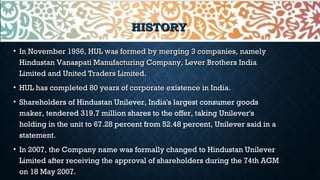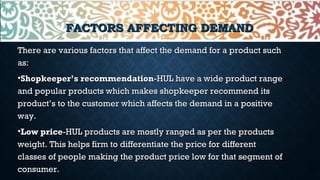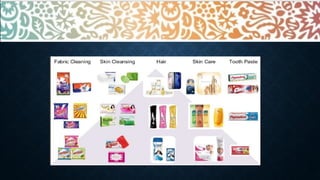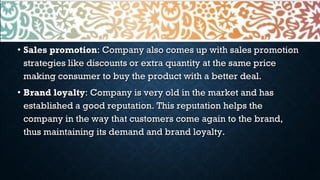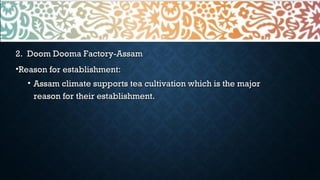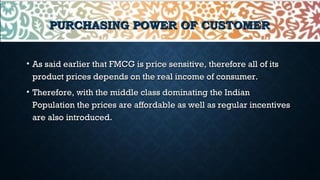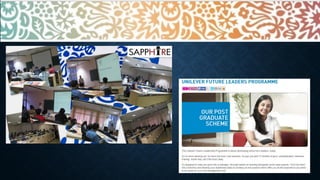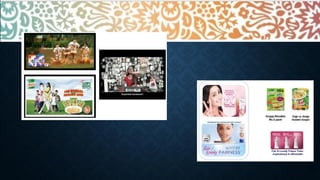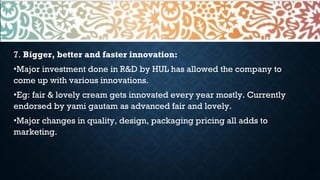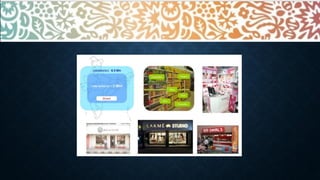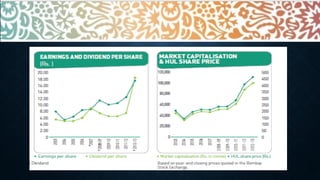Hindustan Unilever
- 2. HISTORYHISTORY • In November 1956, HUL was formed by merging 3 companies, namelyIn November 1956, HUL was formed by merging 3 companies, namely Hindustan Vanaspati Manufacturing Company, Lever Brothers IndiaHindustan Vanaspati Manufacturing Company, Lever Brothers India Limited and United Traders Limited.Limited and United Traders Limited. • HUL has completed 80 years of corporate existence in India.HUL has completed 80 years of corporate existence in India. • Shareholders of Hindustan Unilever, India's largest consumer goods maker, tendered 319.7 million shares to the offer, taking Unilever's holding in the unit to 67.28 percent from 52.48 percent, Unilever said in a statement. • In 2007, the Company name was formally changed to Hindustan Unilever Limited after receiving the approval of shareholders during the 74th AGM on 18 May 2007.
- 4. FACTORS AFFECTING DEMANDFACTORS AFFECTING DEMAND There are various factors that affect the demand for a product suchThere are various factors that affect the demand for a product such as:as: •Shopkeeper’s recommendationShopkeeper’s recommendation-HUL have a wide product range-HUL have a wide product range and popular products which makes shopkeeper recommend itsand popular products which makes shopkeeper recommend its product’s to the customer which affects the demand in a positiveproduct’s to the customer which affects the demand in a positive way.way. •Low priceLow price-HUL products are mostly ranged as per the products-HUL products are mostly ranged as per the products weight. This helps firm to differentiate the price for differentweight. This helps firm to differentiate the price for different classes of people making the product price low for that segment ofclasses of people making the product price low for that segment of consumer.consumer.
- 5. • Need basedNeed based: Products of HUL are need based and that leads to: Products of HUL are need based and that leads to increase in its demand. For example: dove shampoo’s sachets forincrease in its demand. For example: dove shampoo’s sachets for lower middle class.lower middle class. • Brand awarenessBrand awareness: Company has a well-known brand image in the: Company has a well-known brand image in the market created with extensive advertisements. This awarenessmarket created with extensive advertisements. This awareness regarding brand makes customers demand for the product.regarding brand makes customers demand for the product. • PromotionsPromotions: With continuous innovation in promotion and: With continuous innovation in promotion and advertisements the firm has created its image in the eyes of theadvertisements the firm has created its image in the eyes of the customer which has also fueled demand for its products.customer which has also fueled demand for its products.
- 6. • AvailabilityAvailability: Demand is also affected by availability of the products.: Demand is also affected by availability of the products. HUL product is easily available at all the nearby retail outlets.HUL product is easily available at all the nearby retail outlets. • Brand endorsementBrand endorsement: In the modern world where people get: In the modern world where people get connected with the product by seeing any famous personalityconnected with the product by seeing any famous personality endorsing it makes a large difference in the demand for the productendorsing it makes a large difference in the demand for the product but this can be both negative and positive. Eg: Clinic All Clear adbut this can be both negative and positive. Eg: Clinic All Clear ad which is endorsed by Anushka Sharma and Virat Kholi.which is endorsed by Anushka Sharma and Virat Kholi. • LifestyleLifestyle: With proper market assessment HUL products are: With proper market assessment HUL products are launched which suits the lifestyle of those state or class of people.launched which suits the lifestyle of those state or class of people. This definitely leads to rise in demand.This definitely leads to rise in demand.
- 8. • Sales promotionSales promotion: Company also comes up with sales promotion: Company also comes up with sales promotion strategies like discounts or extra quantity at the same pricestrategies like discounts or extra quantity at the same price making consumer to buy the product with a better deal.making consumer to buy the product with a better deal. • Brand loyaltyBrand loyalty: Company is very old in the market and has: Company is very old in the market and has established a good reputation. This reputation helps theestablished a good reputation. This reputation helps the company in the way that customers come again to the brand,company in the way that customers come again to the brand, thus maintaining its demand and brand loyalty.thus maintaining its demand and brand loyalty.
- 9. INDUSTRIAL LOCATIONINDUSTRIAL LOCATION 1. Amli factory and Dapada detergent factory-Silvassa1. Amli factory and Dapada detergent factory-Silvassa •Reason for establishment:Reason for establishment: • To boost industrial development in Silvassa as it was grantedTo boost industrial development in Silvassa as it was granted as a tax free region.as a tax free region. • It has a population of more than 2 lakh people whichIt has a population of more than 2 lakh people which comprises mostly of labourers and therefore labour iscomprises mostly of labourers and therefore labour is available in abundance and is cheap.available in abundance and is cheap.
- 10. 2. Doom Dooma Factory-Assam2. Doom Dooma Factory-Assam •Reason for establishment:Reason for establishment: • Assam climate supports tea cultivation which is the majorAssam climate supports tea cultivation which is the major reason for their establishment.reason for their establishment.
- 11. 3. Khamgaon Factory-Maharashtra3. Khamgaon Factory-Maharashtra •Reason for establishment:Reason for establishment: • Khamgaon is one of the growing cities of Maharashtra. This givesKhamgaon is one of the growing cities of Maharashtra. This gives the company an advantage as government will also be supportingthe company an advantage as government will also be supporting the company for the further growth of both the city and the firm.the company for the further growth of both the city and the firm. • To cater the demands of the deodorant from various parts of theTo cater the demands of the deodorant from various parts of the world Hindustan Unilever decided to establish the company inworld Hindustan Unilever decided to establish the company in khamgaon plant.khamgaon plant.
- 12. 4.4. Sewri Factory-MumbaiSewri Factory-Mumbai • Reason for establishment:Reason for establishment: • Mumbai being a port city its easy to import raw material as well asMumbai being a port city its easy to import raw material as well as export the finished goods at low transportation cost.export the finished goods at low transportation cost. • Mumbai being densely populated and the rate of migrationMumbai being densely populated and the rate of migration increasing from rural areas have provided cheap and abundantincreasing from rural areas have provided cheap and abundant labour to the company.labour to the company. • Mumbai comprises of large chunk of urban population whichMumbai comprises of large chunk of urban population which increases the consumption of the FMCG product and thereforeincreases the consumption of the FMCG product and therefore distribution cost from factory to wholesaler is not high.distribution cost from factory to wholesaler is not high.
- 13. 5.5. Haldia Detergent Factory-West BengalHaldia Detergent Factory-West Bengal • Reason for establishment:Reason for establishment: • Proximity to haldia port.Proximity to haldia port. • Easy allotment of land by Haldia Development Authority (HDA).Easy allotment of land by Haldia Development Authority (HDA). • Uninterrupted power supply.Uninterrupted power supply. • Subsidies and incentives provided by state and centralSubsidies and incentives provided by state and central government.government.
- 14. PRICING POLICYPRICING POLICY • Being a part of the FMCG sector which is price sensitive, HULsBeing a part of the FMCG sector which is price sensitive, HULs pricing strategy depends upon a number of factors such as:pricing strategy depends upon a number of factors such as: Purchasing Power Of CustomerPurchasing Power Of Customer CompetitionCompetition Flexible PricingFlexible Pricing
- 15. PURCHASING POWER OF CUSTOMERPURCHASING POWER OF CUSTOMER • As said earlier that FMCG is price sensitive, therefore all of itsAs said earlier that FMCG is price sensitive, therefore all of its product prices depends on the real income of consumer.product prices depends on the real income of consumer. • Therefore, with the middle class dominating the IndianTherefore, with the middle class dominating the Indian Population the prices are affordable as well as regular incentivesPopulation the prices are affordable as well as regular incentives are also introduced.are also introduced.
- 16. COMPETITIONCOMPETITION • The price of a product is also determined by the competition inThe price of a product is also determined by the competition in the market which plays a major role in the pricing strategy.the market which plays a major role in the pricing strategy. • If the firm is operating in a monopolistic market it can set theIf the firm is operating in a monopolistic market it can set the price at that point till which it is acceptable to the consumers.price at that point till which it is acceptable to the consumers. • But here being a FMCG company, the company is operating in aBut here being a FMCG company, the company is operating in a monopolistic market and so the company has to set prices as permonopolistic market and so the company has to set prices as per the competitors in the market. Because if it sets higher pricesthe competitors in the market. Because if it sets higher prices then the consumer won’t buy the product because of thethen the consumer won’t buy the product because of the presence of the close substitutes.presence of the close substitutes.
- 17. FLEXIBLE PRICINGFLEXIBLE PRICING • HUL follows flexible pricing for all its products.HUL follows flexible pricing for all its products. • Different prices are followed for different variants of each product.Different prices are followed for different variants of each product. • This flexible pricing helps one to buy the quantity he wants and payThis flexible pricing helps one to buy the quantity he wants and pay that much only.that much only. • This pricing also helps in the selling of products to all classes like inThis pricing also helps in the selling of products to all classes like in rural sectors people can buy Shampoo Sachets instead of spendingrural sectors people can buy Shampoo Sachets instead of spending a large sum on a bottle.a large sum on a bottle. • Example – Dove Shampoos are available in Rs 2 sachets to PlasticExample – Dove Shampoos are available in Rs 2 sachets to Plastic bottles worth Rs 150.bottles worth Rs 150.
- 18. HIRING STRATERGYHIRING STRATERGY • Recruits 40 to 50 management trainees from management schools. • Around 700 to 1000 people are recruited in the factories as well as in the sales force. • Hindustan Unilever has been declared best employer by a survey conducted in B-Schools.
- 20. THE PROCESS OF RECRUITMENT • There are 4 regional branches in each of the 4 big metros. • Process: 1. Examination of CV 2. Short-listing 3. Preliminary interview 4. Screening 5. Final interview.
- 21. TRAINING AND DEVELOPMENT OF EMPLOYEES • 15 months of intensive training. • The Levers Business Leadership Training Program (BLTP)- Thorough warming up of trainees. • The rigorous training will help the recruits to take calculated risks, cope with the pressures of corporate life and hone the leadership skills. • All HUL units provide some form of training and/or education programs, both classroom and on the job training at the plant itself. • The company has set up a learning center where the employees are taught in their local languages.
- 23. MARKETING STRATERGYMARKETING STRATERGY 1. Pan pyramid straggling portfolio: •To promote the sale of such a vast product range HUL charges different prices for different products according to the class and segments of the society. •This shapes a pyramid where at the below lies the low level product that get sold the most then comes the middle level of pyramid where sales decreases and top of the pyramid only the upper middle class can afford it.
- 24. 2. Pushing consumer for more usage: •The firm uses low priced sachets which prompts the consumer to purchase the products. •This also pushes the usage of the product and increases the brand loyalty of the consumers towards the brand. •Seasonal products are also launched by HUL this also acts as a marketing strategy of the company increasing its sales and the peak seasons. Eg: Vaseline lotions for summer and winter season.
- 25. 3.Competitive and compelling communication: •Under this the advertisements aired by HUL prompts the consumers to purchase the product. •The ads launched create a sense of connectivity and develop those emotions which attract the consumer towards that product when they are in market for a purchase. •This awareness persuades the consumers to purchase the product leading to increase in sale of HUL products.
- 27. 4. Highlighting benefits: •Provides additional benefits in its individual brand. •This makes people get value for money and maximum satisfaction or utility. •Eg: dove comes with various other products like dove conditioner with its shampoo. 5. Increasing consumption in rural market: •More availability of Rs.1 sachets in the rural India. One of the ways of packaging to market the product. •Awareness camps about the products which also rural people to understand the use and advantages of the product and influence them to buy the product at cheap prices.
- 29. 6. Betting on big starts for advertising: •Today’s world is all about show business the higher and bigger person endorses yours product people will be more attracted towards it. •HUL products are endorsed by many big celebs and popular film stars they influence the consumers to purchase the product. •Eg: Juhi Chawla - advertisement of Kissan jam.
- 30. 7. Bigger, better and faster innovation: •Major investment done in R&D by HUL has allowed the company to come up with various innovations. •Eg: fair & lovely cream gets innovated every year mostly. Currently endorsed by yami gautam as advanced fair and lovely. •Major changes in quality, design, packaging pricing all adds to marketing.
- 32. 8. Stepping up front end execution: •With the increasing globalization and the rapid development of mall culture in India the availability of product is everywhere. •Various retail outlets of unilever products are opened by the company itself like lakme. •Increasing brand image in the market has created various stores for its product, providing better quality product with better service.
- 34. FINANCIAL PERFORMANCE AND PROFITABILITY
- 36. NATURE OF MARKETNATURE OF MARKET • The nature of market in FMCG firms is a monopolistic market.The nature of market in FMCG firms is a monopolistic market. • Large number of sellers, selling FMCG Goods.Large number of sellers, selling FMCG Goods. • Large number of buyers.Large number of buyers. • Sellers selling close substitutes • Selling Cost: It needs to work more on R&D and sales promotions strategies. • Demand curve in the monopolistic market is a flatter demand curve showing that the elasticity of the products is relatively elastic in nature. Potential Competitors: ITC Limited, Britannia Industries Ltd.,Potential Competitors: ITC Limited, Britannia Industries Ltd., Nestle India, etc.Nestle India, etc.


